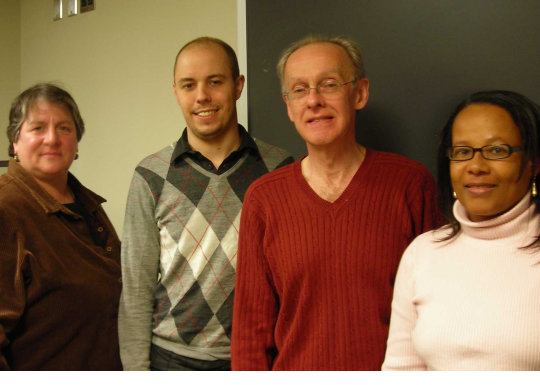 |
On March 31, the PSC and the CUNY Research Foundation (RF) reached a tentative contract agreement for RF employees at three CUNY campuses. If union members vote to ratify the settlement, it will mark the first time that these RF employees have had the security of a union contract.
“I feel very proud of this achievement. It represents a victory for the RF employees at the Graduate Center, LaGuardia and City Tech, who have fought tirelessly to win this contract,” said Georgina Pierre-Louis, a bargaining team member who works at the Graduate Center’s Howard Samuels Center.
GAINS
The tentative contracts cover 600 full- and part-time Research Foundation workers at the three campuses. They work on research projects, as instructors and counselors and in a wide range of other jobs, with wages and benefits funded by outside grants. Their paychecks come from the Research Foundation, which administers grant-based projects at CUNY.
Although many have worked continuously on RF lines for years, the Foundation officially treats them as new employees with each grant-funding cycle. Workers had no guarantee that accrued leave time would carry over from one appointment to the next, and some have worked for years without a raise. Correcting such inequities are among key gains in the agreement.
Major provisions include:
- Across-the-board raises of 2% in each of the four years of the contract, with higher increases for those earning less than $25,000 a year or $13.50 per hour. Principal investigators and project directors will be free to give greater increases at their discretion.
- A “lockbox” and other procedures to ensure that RF workers do not lose accrued annual leave from one appointment period to the next
- A grievance procedure to enforce the contract, including binding arbitration
- Guarantee of at least two weeks’ notice if a position is eliminated before the end of the appointment period
- Tuition reimbursement for courses at CUNY
- Preservation of health insurance options for those eligible, and establishing gradual increases in employees’ share of premium costs instead of an immediate 8 percentage point increase to what other RF employees are paying now.
“When you look around the country and see unions struggling to get things, it was wonderful to have this come through,” said Jay Klokker, a negotiating team member who teaches ESL at City Tech.
The PSC Executive Council voted at its April 14 meeting to recommend the contract agreement to the union’s Delegate Assembly (DA), which will consider the settlement at its meeting on April 28. If the DA also approves, RF members at the three campuses will then vote on ratification during the first two weeks of May.
When RF employees at LaGuardia, City Tech and the Graduate Center voted in union elections in 2004 and 2005, more than 80% in each unit supported unionization. RF management opposed the union drive and made heavy use of delaying tactics. At the Graduate Center, for example, it forced a two-year holdup between when the ballots were cast and when they were counted. The foot-dragging continued at the negotiating table, as the RF spent up to $500,000 per year on the anti-union law firm of Nixon Peabody LLP.
To force movement in the talks, RF workers and their supporters picketed and distributed leaflets outside meetings of the Foundation’s board of directors. Activists stepped up the pressure with coordinated protests at all three campuses last September, and union activists said the organizing had an impact. “[RF-CUNY President Richard Rothbard] felt embarrassed about all these demonstrations,” said Pierre-Louis. “People were talking about it.”
Meanwhile bargaining team members had to build unity by learning more about each other’s circumstances, participating member Ellen Noonan told Clarion. For example, many RF personnel at LaGuardia and City Tech are instructors, while RF workers at the Graduate Center, where Noonan works, are mainly involved in research and administrative work.
Instructors “would be unable to gain seniority if taking summer breaks was held against them,” Noonan explained. So it was important that union members from the Graduate Center supported their colleagues’ demand that time off in the summer not be counted as a break in service, even though in their own workplace this was not a major issue.
‘FIRST STEP’
Union bargaining team members welcomed the settlement as a good beginning. “People had earned vacation time they were unable to take,” said Noonan. “This was a fundamental unfairness that will now be rectified by the contract.”
Pierre-Louis, who had not received a pay raise in nine years, described the 2% raise “as a step in the right direction,” while Sandra Johnson of RF-LaGuardia said she hoped PIs and PDs will recognize employees’ contributions with pay increases beyond this minimum.
“This is a good first step,” Klokker said. “Now we need to think about how we can make it stronger and better.”

